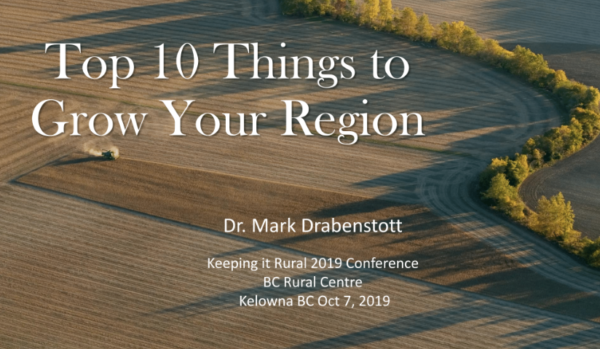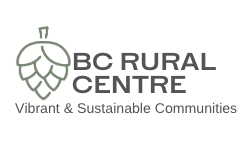
Keeping It Rural 2019 in the Books!

Keeping It Rural, our biennial conference focussing on issues of importance to rural and First Nations citizens was held on October 7th and 8th in Kelowna.
An outstanding lineup of presenters tackled topics ranging from community forestry to innovative ways to attract young people to rural communities.
This year’s conference was kicked off by Dr. Mark Drabenstott, former chair of the Organization for Economic Cooperation & Development’s Regional Development Policy Committee, gave a lively presentation on the “top 10 things to grow your region.” Dr. Drabensott was followed by related presentations by BC Community Forest Association Executive Director Jennifer Gunter, and BC Rural Centre Executive Director Gordon Borgstrom.
Ms. Gunter addressed the ways BC’s community forests are changing the way our forests are managed, while Mr. Borgstrom focussed on creating more value and rural community benefits from BC’s public forests.
They were followed by Vernon councillor and former mayor Akbal Mund, and Okanagan Indian Band councillor Sheldon Louis, who together addressed the increasingly critical importance of First Nations-local government collaboration.
The final morning session, led by Dr. David Snadden, UBC Chair in Rural Health, featured a discussion of the current state of healthcare delivery in rural and First Nations BC, as well as new initiatives that hold considerable promise for improved access to excellent care for rural British Columbians.
After lunch, New Mexico-based Blanca Amador Surgeon of the Rural Community Assistance Corporation (RCAC), gave a thought-provoking talk on the eight forms of community wealth. Ms. Surgeon was followed by Milan Wall, founder and Co-Director of Nebraska’s Heartland Center for Leadership Development, with over 40 years of experience working with rural communities across the United States and Canada.He is co-author of a number of publications on leadership and community development, including The Entrepreneurial Community: A Strategic Leadership Approach to Community Survival, and Clues to Rural Community Survival. In his intriguing presentation, Mr. Wall gave some informative examples of Midwestern U.S. small towns that have managed to transform their economies in the 21st century.
Next, the challenging issue of how rural communities can attract entrepreneurial young urbanites was addressed by Kaslo‘s mayor, Suzan Hewatt, young mother and newly-arrived Kaslo citizen Rochelle Longvall, and BC Rural Centre’s communications director Randy Morse. Their presentation on BCRC’s innovative Escape the City Contest — it’s assumptions and goals, and most importantly, its results, led to an animated discussion of how small towns might revitalize themselves by luring young city dwellers “to the country.”
This was followed by a “rural issues speed dating” session, with participants able to circulate from table to table, each of which featured an area expert able to lead a discussion and/or answer questions on a a range of topics conference participants had earlier identified as being of particular interest to them.
Finally, Rankin MacSween, CEO of Cape Breton’s New Dawn Enterprises, the oldest Community Development Corporation in Canada, gave a fabulous keynote. At times hilarious, often informative, and throughly inspirational, MacSween’s tale of how one deeply rural place has managed to set the stage for a self-generated renaissance was a stirringly fitting conclusion to a great day of rural-centric dialogue.
Tuesday saw two Day One presenters — Milan Wall and Blanca Surgeon — return to lead in-depth workshops.
Mr. Wall introduced the 20 Clues to Rural Community Survival, one of the Heartland Center’s most popular and effective training tools, including a list of vital characteristics that provides an “ideal” benchmark against which people can measure their own community. It moves people naturally from theory, to strategy, to action.
Ms. Surgeon’s workshop focussed on the WealthWorks program. WealthWorks is a proven approach to rural economic development that brings together and connects rural community assets to meet market demand. Ms. Surgeon described the WealthWorks process, and provided examples of its implementation in small rural communities throughout the northwestern U.S.
As always at Keeping It Rural, in addition to leaving both informed and inspired, participants came away with useful new contacts and a general sense of optimism about the opportunities rural communities and First Nations have before them.
